ENTREPRENEURSHIP AND SMALL BUSINESS MANAGEMENT Report for University
VerifiedAdded on 2020/01/28
|16
|3869
|123
Report
AI Summary
This report provides a comprehensive analysis of entrepreneurship and small business management, examining various types of entrepreneurial ventures, including enterprise-level, corporate-level, scalable startup, social, and small business entrepreneurship. It explores the similarities and differences between social and lifestyle entrepreneurship, investigates the impact of micro and small businesses on the UK economy, and assesses the significance of small businesses and business start-ups to the growth of the social economy. The report also delves into the characteristic traits and skills of successful entrepreneurs like Elizabeth Gooch and Tom Mercer, comparing and contrasting their approaches with those of business managers. Furthermore, it analyzes how personal background and experience can hinder or foster entrepreneurship, comparing and contrasting the experiences of Donald Trump and Jack Ma. The report utilizes relevant data and statistics to support its findings, offering a detailed examination of the UK's entrepreneurial landscape.
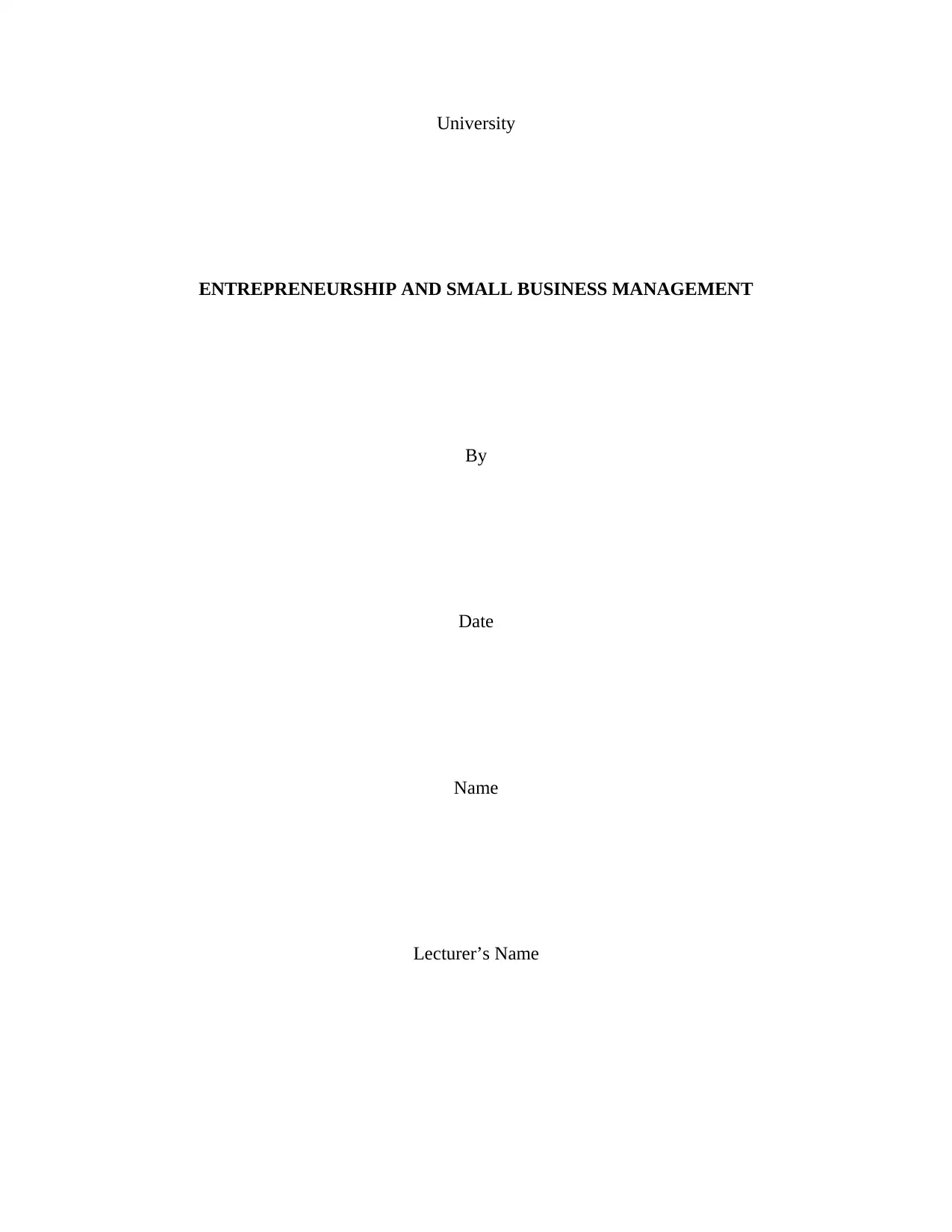
University
ENTREPRENEURSHIP AND SMALL BUSINESS MANAGEMENT
By
Date
Name
Lecturer’s Name
ENTREPRENEURSHIP AND SMALL BUSINESS MANAGEMENT
By
Date
Name
Lecturer’s Name
Paraphrase This Document
Need a fresh take? Get an instant paraphrase of this document with our AI Paraphraser
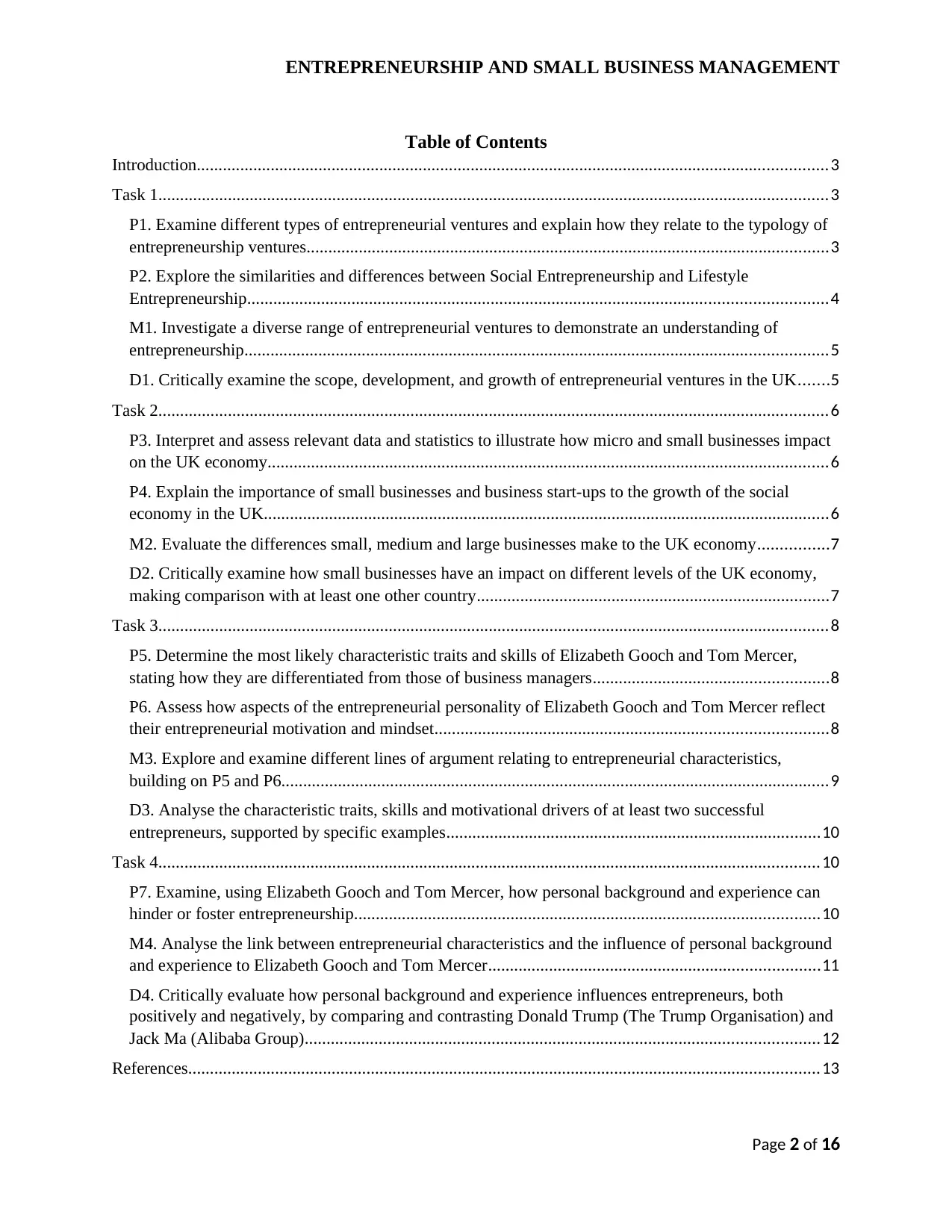
ENTREPRENEURSHIP AND SMALL BUSINESS MANAGEMENT
Table of Contents
Introduction.................................................................................................................................................3
Task 1..........................................................................................................................................................3
P1. Examine different types of entrepreneurial ventures and explain how they relate to the typology of
entrepreneurship ventures........................................................................................................................3
P2. Explore the similarities and differences between Social Entrepreneurship and Lifestyle
Entrepreneurship.....................................................................................................................................4
M1. Investigate a diverse range of entrepreneurial ventures to demonstrate an understanding of
entrepreneurship......................................................................................................................................5
D1. Critically examine the scope, development, and growth of entrepreneurial ventures in the UK.......5
Task 2..........................................................................................................................................................6
P3. Interpret and assess relevant data and statistics to illustrate how micro and small businesses impact
on the UK economy.................................................................................................................................6
P4. Explain the importance of small businesses and business start-ups to the growth of the social
economy in the UK..................................................................................................................................6
M2. Evaluate the differences small, medium and large businesses make to the UK economy................7
D2. Critically examine how small businesses have an impact on different levels of the UK economy,
making comparison with at least one other country.................................................................................7
Task 3..........................................................................................................................................................8
P5. Determine the most likely characteristic traits and skills of Elizabeth Gooch and Tom Mercer,
stating how they are differentiated from those of business managers......................................................8
P6. Assess how aspects of the entrepreneurial personality of Elizabeth Gooch and Tom Mercer reflect
their entrepreneurial motivation and mindset..........................................................................................8
M3. Explore and examine different lines of argument relating to entrepreneurial characteristics,
building on P5 and P6..............................................................................................................................9
D3. Analyse the characteristic traits, skills and motivational drivers of at least two successful
entrepreneurs, supported by specific examples......................................................................................10
Task 4........................................................................................................................................................10
P7. Examine, using Elizabeth Gooch and Tom Mercer, how personal background and experience can
hinder or foster entrepreneurship...........................................................................................................10
M4. Analyse the link between entrepreneurial characteristics and the influence of personal background
and experience to Elizabeth Gooch and Tom Mercer............................................................................11
D4. Critically evaluate how personal background and experience influences entrepreneurs, both
positively and negatively, by comparing and contrasting Donald Trump (The Trump Organisation) and
Jack Ma (Alibaba Group)......................................................................................................................12
References.................................................................................................................................................13
Page 2 of 16
Table of Contents
Introduction.................................................................................................................................................3
Task 1..........................................................................................................................................................3
P1. Examine different types of entrepreneurial ventures and explain how they relate to the typology of
entrepreneurship ventures........................................................................................................................3
P2. Explore the similarities and differences between Social Entrepreneurship and Lifestyle
Entrepreneurship.....................................................................................................................................4
M1. Investigate a diverse range of entrepreneurial ventures to demonstrate an understanding of
entrepreneurship......................................................................................................................................5
D1. Critically examine the scope, development, and growth of entrepreneurial ventures in the UK.......5
Task 2..........................................................................................................................................................6
P3. Interpret and assess relevant data and statistics to illustrate how micro and small businesses impact
on the UK economy.................................................................................................................................6
P4. Explain the importance of small businesses and business start-ups to the growth of the social
economy in the UK..................................................................................................................................6
M2. Evaluate the differences small, medium and large businesses make to the UK economy................7
D2. Critically examine how small businesses have an impact on different levels of the UK economy,
making comparison with at least one other country.................................................................................7
Task 3..........................................................................................................................................................8
P5. Determine the most likely characteristic traits and skills of Elizabeth Gooch and Tom Mercer,
stating how they are differentiated from those of business managers......................................................8
P6. Assess how aspects of the entrepreneurial personality of Elizabeth Gooch and Tom Mercer reflect
their entrepreneurial motivation and mindset..........................................................................................8
M3. Explore and examine different lines of argument relating to entrepreneurial characteristics,
building on P5 and P6..............................................................................................................................9
D3. Analyse the characteristic traits, skills and motivational drivers of at least two successful
entrepreneurs, supported by specific examples......................................................................................10
Task 4........................................................................................................................................................10
P7. Examine, using Elizabeth Gooch and Tom Mercer, how personal background and experience can
hinder or foster entrepreneurship...........................................................................................................10
M4. Analyse the link between entrepreneurial characteristics and the influence of personal background
and experience to Elizabeth Gooch and Tom Mercer............................................................................11
D4. Critically evaluate how personal background and experience influences entrepreneurs, both
positively and negatively, by comparing and contrasting Donald Trump (The Trump Organisation) and
Jack Ma (Alibaba Group)......................................................................................................................12
References.................................................................................................................................................13
Page 2 of 16

ENTREPRENEURSHIP AND SMALL BUSINESS MANAGEMENT
Page 3 of 16
Page 3 of 16
⊘ This is a preview!⊘
Do you want full access?
Subscribe today to unlock all pages.

Trusted by 1+ million students worldwide
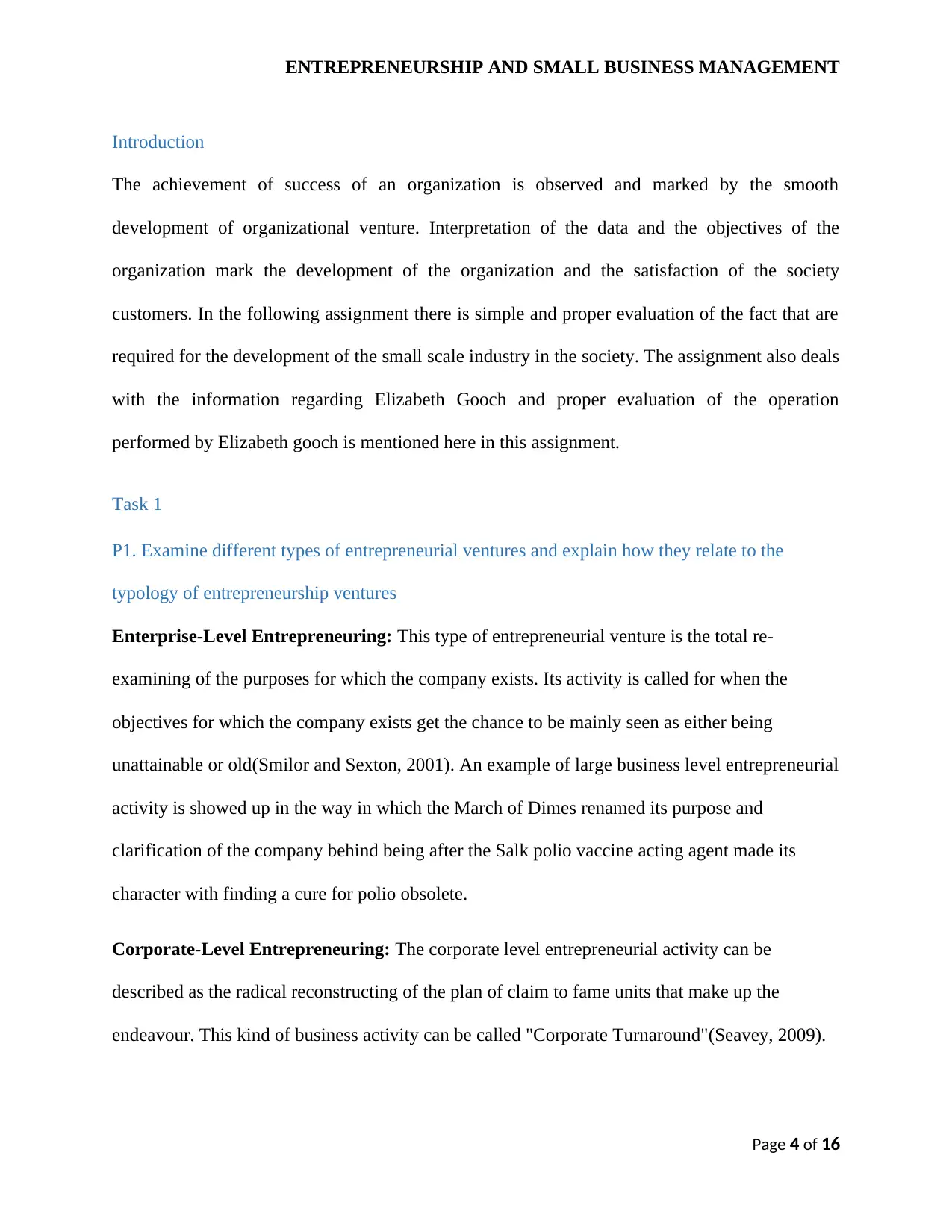
ENTREPRENEURSHIP AND SMALL BUSINESS MANAGEMENT
Introduction
The achievement of success of an organization is observed and marked by the smooth
development of organizational venture. Interpretation of the data and the objectives of the
organization mark the development of the organization and the satisfaction of the society
customers. In the following assignment there is simple and proper evaluation of the fact that are
required for the development of the small scale industry in the society. The assignment also deals
with the information regarding Elizabeth Gooch and proper evaluation of the operation
performed by Elizabeth gooch is mentioned here in this assignment.
Task 1
P1. Examine different types of entrepreneurial ventures and explain how they relate to the
typology of entrepreneurship ventures
Enterprise-Level Entrepreneuring: This type of entrepreneurial venture is the total re-
examining of the purposes for which the company exists. Its activity is called for when the
objectives for which the company exists get the chance to be mainly seen as either being
unattainable or old(Smilor and Sexton, 2001). An example of large business level entrepreneurial
activity is showed up in the way in which the March of Dimes renamed its purpose and
clarification of the company behind being after the Salk polio vaccine acting agent made its
character with finding a cure for polio obsolete.
Corporate-Level Entrepreneuring: The corporate level entrepreneurial activity can be
described as the radical reconstructing of the plan of claim to fame units that make up the
endeavour. This kind of business activity can be called "Corporate Turnaround"(Seavey, 2009).
Page 4 of 16
Introduction
The achievement of success of an organization is observed and marked by the smooth
development of organizational venture. Interpretation of the data and the objectives of the
organization mark the development of the organization and the satisfaction of the society
customers. In the following assignment there is simple and proper evaluation of the fact that are
required for the development of the small scale industry in the society. The assignment also deals
with the information regarding Elizabeth Gooch and proper evaluation of the operation
performed by Elizabeth gooch is mentioned here in this assignment.
Task 1
P1. Examine different types of entrepreneurial ventures and explain how they relate to the
typology of entrepreneurship ventures
Enterprise-Level Entrepreneuring: This type of entrepreneurial venture is the total re-
examining of the purposes for which the company exists. Its activity is called for when the
objectives for which the company exists get the chance to be mainly seen as either being
unattainable or old(Smilor and Sexton, 2001). An example of large business level entrepreneurial
activity is showed up in the way in which the March of Dimes renamed its purpose and
clarification of the company behind being after the Salk polio vaccine acting agent made its
character with finding a cure for polio obsolete.
Corporate-Level Entrepreneuring: The corporate level entrepreneurial activity can be
described as the radical reconstructing of the plan of claim to fame units that make up the
endeavour. This kind of business activity can be called "Corporate Turnaround"(Seavey, 2009).
Page 4 of 16
Paraphrase This Document
Need a fresh take? Get an instant paraphrase of this document with our AI Paraphraser
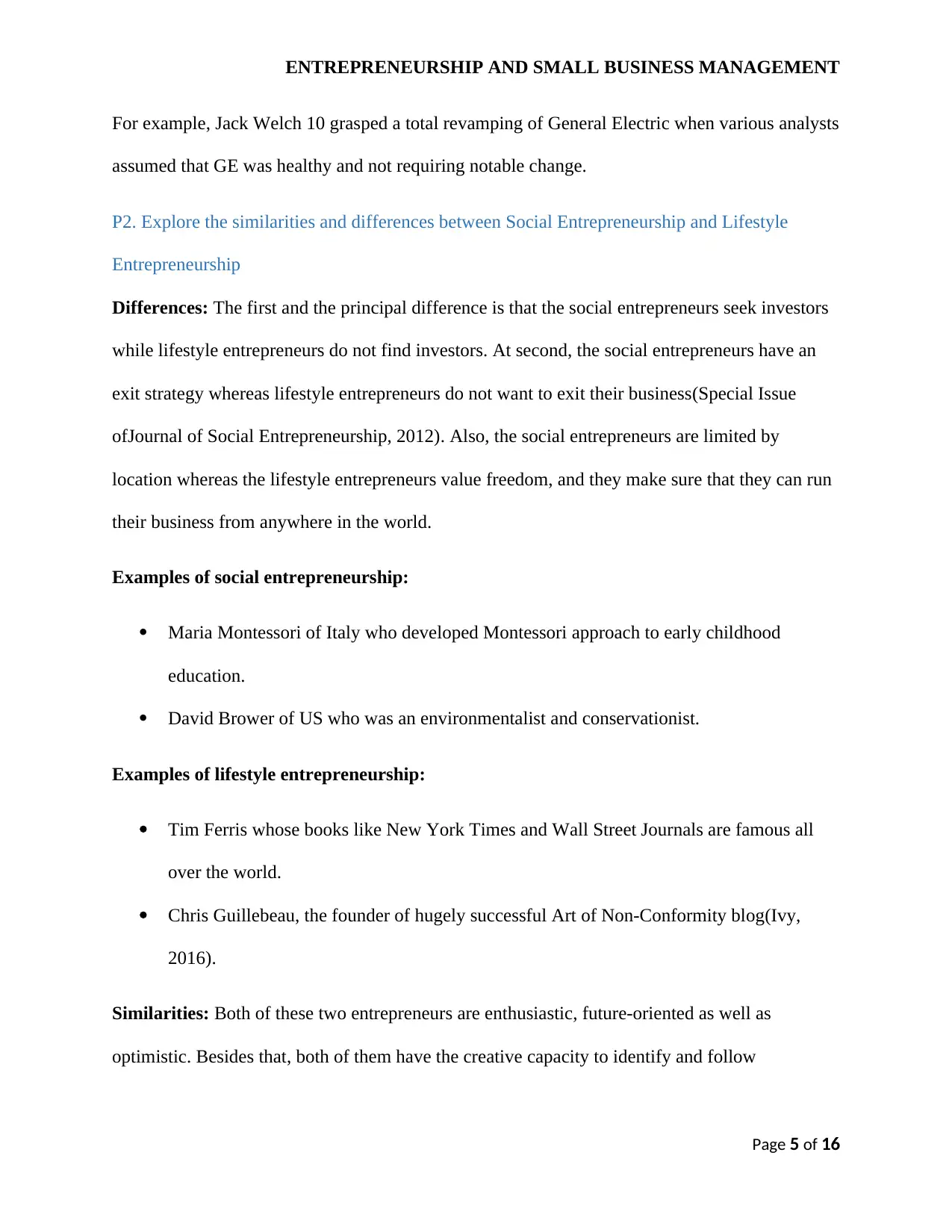
ENTREPRENEURSHIP AND SMALL BUSINESS MANAGEMENT
For example, Jack Welch 10 grasped a total revamping of General Electric when various analysts
assumed that GE was healthy and not requiring notable change.
P2. Explore the similarities and differences between Social Entrepreneurship and Lifestyle
Entrepreneurship
Differences: The first and the principal difference is that the social entrepreneurs seek investors
while lifestyle entrepreneurs do not find investors. At second, the social entrepreneurs have an
exit strategy whereas lifestyle entrepreneurs do not want to exit their business(Special Issue
ofJournal of Social Entrepreneurship, 2012). Also, the social entrepreneurs are limited by
location whereas the lifestyle entrepreneurs value freedom, and they make sure that they can run
their business from anywhere in the world.
Examples of social entrepreneurship:
Maria Montessori of Italy who developed Montessori approach to early childhood
education.
David Brower of US who was an environmentalist and conservationist.
Examples of lifestyle entrepreneurship:
Tim Ferris whose books like New York Times and Wall Street Journals are famous all
over the world.
Chris Guillebeau, the founder of hugely successful Art of Non-Conformity blog(Ivy,
2016).
Similarities: Both of these two entrepreneurs are enthusiastic, future-oriented as well as
optimistic. Besides that, both of them have the creative capacity to identify and follow
Page 5 of 16
For example, Jack Welch 10 grasped a total revamping of General Electric when various analysts
assumed that GE was healthy and not requiring notable change.
P2. Explore the similarities and differences between Social Entrepreneurship and Lifestyle
Entrepreneurship
Differences: The first and the principal difference is that the social entrepreneurs seek investors
while lifestyle entrepreneurs do not find investors. At second, the social entrepreneurs have an
exit strategy whereas lifestyle entrepreneurs do not want to exit their business(Special Issue
ofJournal of Social Entrepreneurship, 2012). Also, the social entrepreneurs are limited by
location whereas the lifestyle entrepreneurs value freedom, and they make sure that they can run
their business from anywhere in the world.
Examples of social entrepreneurship:
Maria Montessori of Italy who developed Montessori approach to early childhood
education.
David Brower of US who was an environmentalist and conservationist.
Examples of lifestyle entrepreneurship:
Tim Ferris whose books like New York Times and Wall Street Journals are famous all
over the world.
Chris Guillebeau, the founder of hugely successful Art of Non-Conformity blog(Ivy,
2016).
Similarities: Both of these two entrepreneurs are enthusiastic, future-oriented as well as
optimistic. Besides that, both of them have the creative capacity to identify and follow
Page 5 of 16
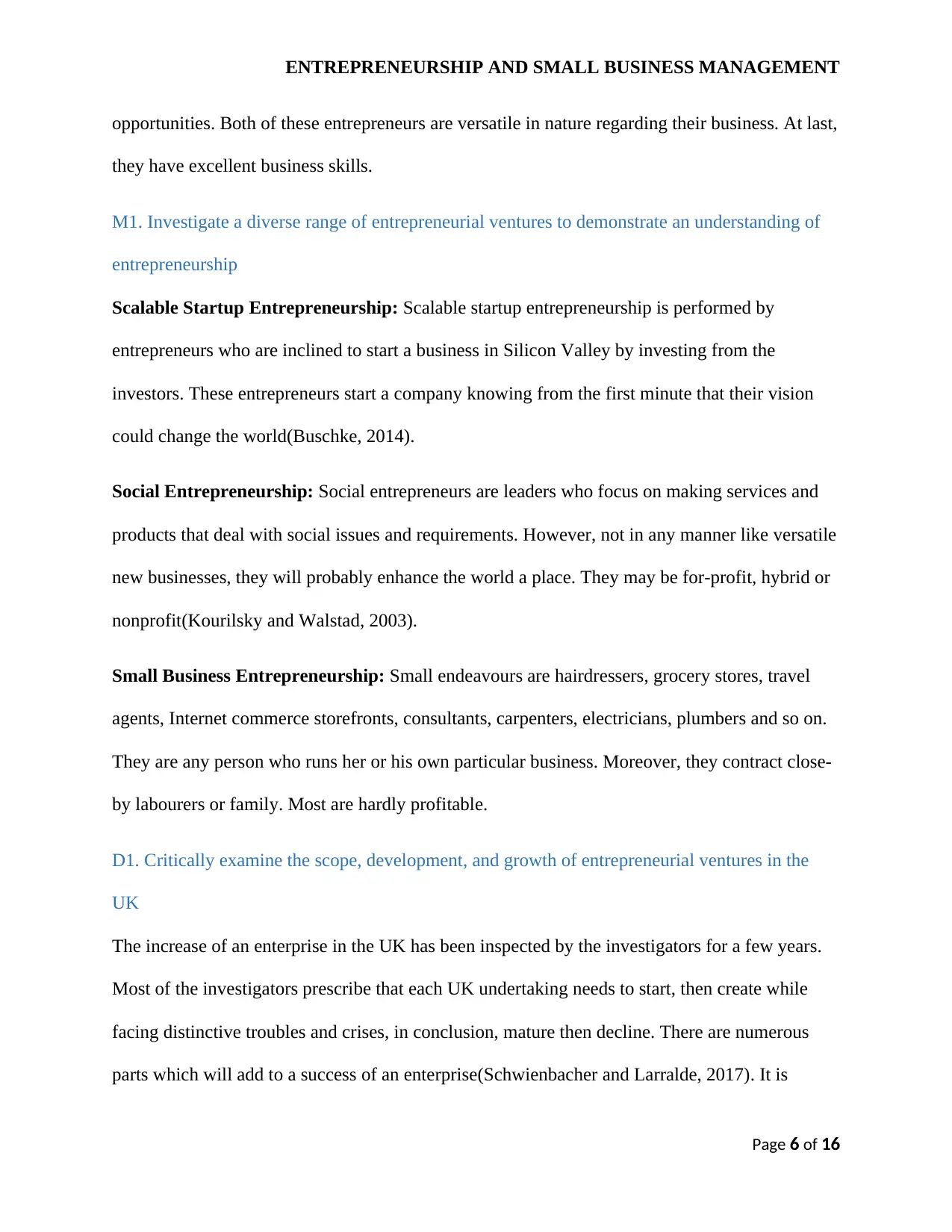
ENTREPRENEURSHIP AND SMALL BUSINESS MANAGEMENT
opportunities. Both of these entrepreneurs are versatile in nature regarding their business. At last,
they have excellent business skills.
M1. Investigate a diverse range of entrepreneurial ventures to demonstrate an understanding of
entrepreneurship
Scalable Startup Entrepreneurship: Scalable startup entrepreneurship is performed by
entrepreneurs who are inclined to start a business in Silicon Valley by investing from the
investors. These entrepreneurs start a company knowing from the first minute that their vision
could change the world(Buschke, 2014).
Social Entrepreneurship: Social entrepreneurs are leaders who focus on making services and
products that deal with social issues and requirements. However, not in any manner like versatile
new businesses, they will probably enhance the world a place. They may be for-profit, hybrid or
nonprofit(Kourilsky and Walstad, 2003).
Small Business Entrepreneurship: Small endeavours are hairdressers, grocery stores, travel
agents, Internet commerce storefronts, consultants, carpenters, electricians, plumbers and so on.
They are any person who runs her or his own particular business. Moreover, they contract close-
by labourers or family. Most are hardly profitable.
D1. Critically examine the scope, development, and growth of entrepreneurial ventures in the
UK
The increase of an enterprise in the UK has been inspected by the investigators for a few years.
Most of the investigators prescribe that each UK undertaking needs to start, then create while
facing distinctive troubles and crises, in conclusion, mature then decline. There are numerous
parts which will add to a success of an enterprise(Schwienbacher and Larralde, 2017). It is
Page 6 of 16
opportunities. Both of these entrepreneurs are versatile in nature regarding their business. At last,
they have excellent business skills.
M1. Investigate a diverse range of entrepreneurial ventures to demonstrate an understanding of
entrepreneurship
Scalable Startup Entrepreneurship: Scalable startup entrepreneurship is performed by
entrepreneurs who are inclined to start a business in Silicon Valley by investing from the
investors. These entrepreneurs start a company knowing from the first minute that their vision
could change the world(Buschke, 2014).
Social Entrepreneurship: Social entrepreneurs are leaders who focus on making services and
products that deal with social issues and requirements. However, not in any manner like versatile
new businesses, they will probably enhance the world a place. They may be for-profit, hybrid or
nonprofit(Kourilsky and Walstad, 2003).
Small Business Entrepreneurship: Small endeavours are hairdressers, grocery stores, travel
agents, Internet commerce storefronts, consultants, carpenters, electricians, plumbers and so on.
They are any person who runs her or his own particular business. Moreover, they contract close-
by labourers or family. Most are hardly profitable.
D1. Critically examine the scope, development, and growth of entrepreneurial ventures in the
UK
The increase of an enterprise in the UK has been inspected by the investigators for a few years.
Most of the investigators prescribe that each UK undertaking needs to start, then create while
facing distinctive troubles and crises, in conclusion, mature then decline. There are numerous
parts which will add to a success of an enterprise(Schwienbacher and Larralde, 2017). It is
Page 6 of 16
⊘ This is a preview!⊘
Do you want full access?
Subscribe today to unlock all pages.

Trusted by 1+ million students worldwide
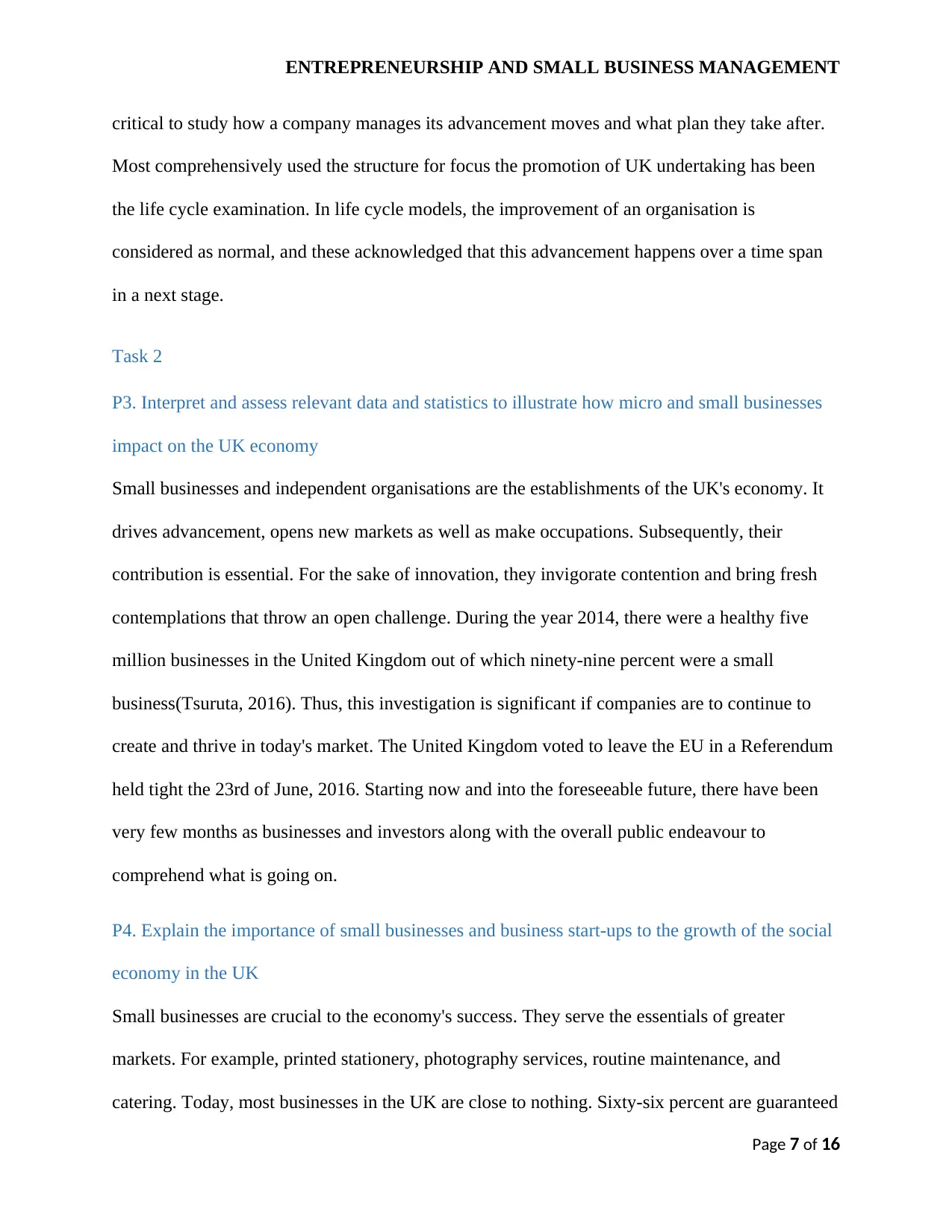
ENTREPRENEURSHIP AND SMALL BUSINESS MANAGEMENT
critical to study how a company manages its advancement moves and what plan they take after.
Most comprehensively used the structure for focus the promotion of UK undertaking has been
the life cycle examination. In life cycle models, the improvement of an organisation is
considered as normal, and these acknowledged that this advancement happens over a time span
in a next stage.
Task 2
P3. Interpret and assess relevant data and statistics to illustrate how micro and small businesses
impact on the UK economy
Small businesses and independent organisations are the establishments of the UK's economy. It
drives advancement, opens new markets as well as make occupations. Subsequently, their
contribution is essential. For the sake of innovation, they invigorate contention and bring fresh
contemplations that throw an open challenge. During the year 2014, there were a healthy five
million businesses in the United Kingdom out of which ninety-nine percent were a small
business(Tsuruta, 2016). Thus, this investigation is significant if companies are to continue to
create and thrive in today's market. The United Kingdom voted to leave the EU in a Referendum
held tight the 23rd of June, 2016. Starting now and into the foreseeable future, there have been
very few months as businesses and investors along with the overall public endeavour to
comprehend what is going on.
P4. Explain the importance of small businesses and business start-ups to the growth of the social
economy in the UK
Small businesses are crucial to the economy's success. They serve the essentials of greater
markets. For example, printed stationery, photography services, routine maintenance, and
catering. Today, most businesses in the UK are close to nothing. Sixty-six percent are guaranteed
Page 7 of 16
critical to study how a company manages its advancement moves and what plan they take after.
Most comprehensively used the structure for focus the promotion of UK undertaking has been
the life cycle examination. In life cycle models, the improvement of an organisation is
considered as normal, and these acknowledged that this advancement happens over a time span
in a next stage.
Task 2
P3. Interpret and assess relevant data and statistics to illustrate how micro and small businesses
impact on the UK economy
Small businesses and independent organisations are the establishments of the UK's economy. It
drives advancement, opens new markets as well as make occupations. Subsequently, their
contribution is essential. For the sake of innovation, they invigorate contention and bring fresh
contemplations that throw an open challenge. During the year 2014, there were a healthy five
million businesses in the United Kingdom out of which ninety-nine percent were a small
business(Tsuruta, 2016). Thus, this investigation is significant if companies are to continue to
create and thrive in today's market. The United Kingdom voted to leave the EU in a Referendum
held tight the 23rd of June, 2016. Starting now and into the foreseeable future, there have been
very few months as businesses and investors along with the overall public endeavour to
comprehend what is going on.
P4. Explain the importance of small businesses and business start-ups to the growth of the social
economy in the UK
Small businesses are crucial to the economy's success. They serve the essentials of greater
markets. For example, printed stationery, photography services, routine maintenance, and
catering. Today, most businesses in the UK are close to nothing. Sixty-six percent are guaranteed
Page 7 of 16
Paraphrase This Document
Need a fresh take? Get an instant paraphrase of this document with our AI Paraphraser
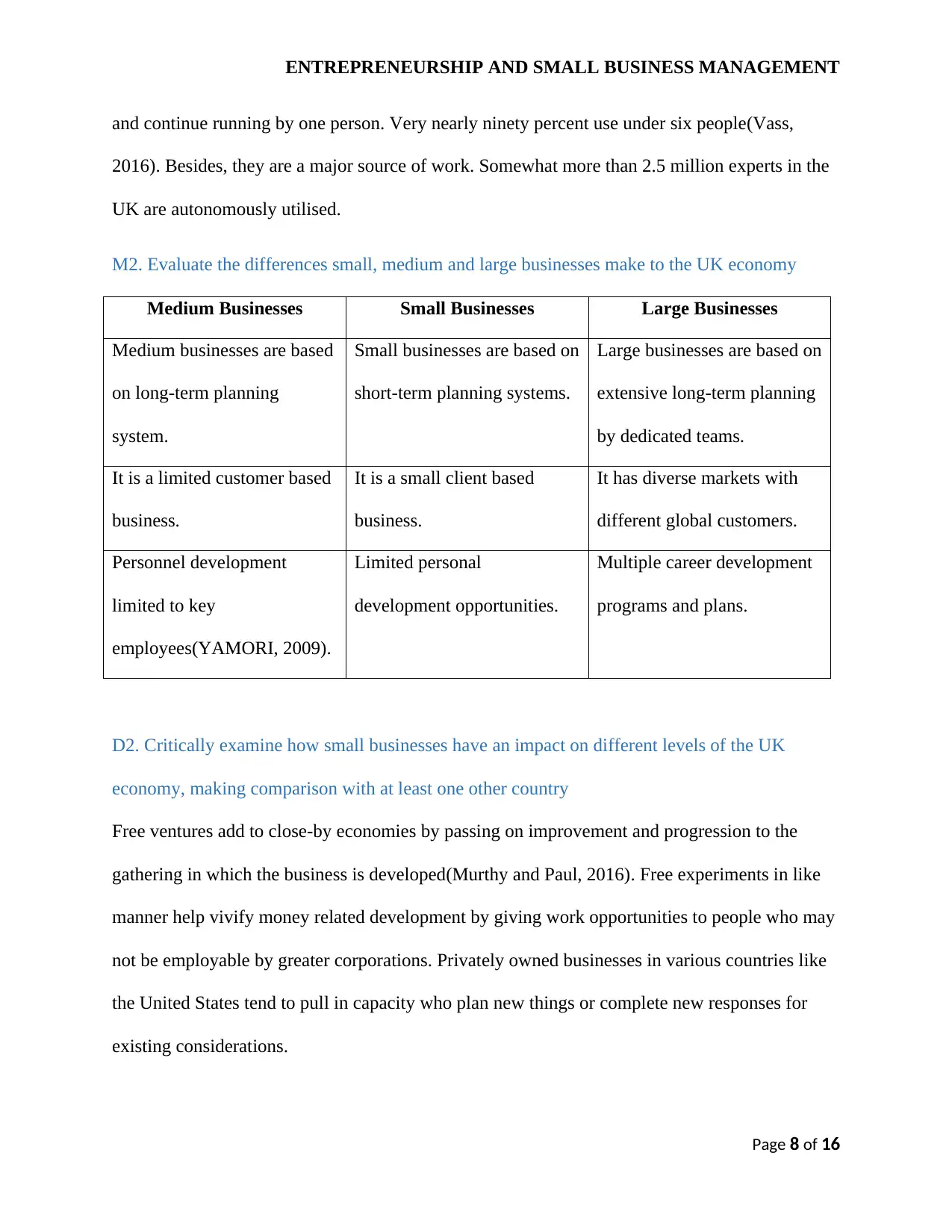
ENTREPRENEURSHIP AND SMALL BUSINESS MANAGEMENT
and continue running by one person. Very nearly ninety percent use under six people(Vass,
2016). Besides, they are a major source of work. Somewhat more than 2.5 million experts in the
UK are autonomously utilised.
M2. Evaluate the differences small, medium and large businesses make to the UK economy
Medium Businesses Small Businesses Large Businesses
Medium businesses are based
on long-term planning
system.
Small businesses are based on
short-term planning systems.
Large businesses are based on
extensive long-term planning
by dedicated teams.
It is a limited customer based
business.
It is a small client based
business.
It has diverse markets with
different global customers.
Personnel development
limited to key
employees(YAMORI, 2009).
Limited personal
development opportunities.
Multiple career development
programs and plans.
D2. Critically examine how small businesses have an impact on different levels of the UK
economy, making comparison with at least one other country
Free ventures add to close-by economies by passing on improvement and progression to the
gathering in which the business is developed(Murthy and Paul, 2016). Free experiments in like
manner help vivify money related development by giving work opportunities to people who may
not be employable by greater corporations. Privately owned businesses in various countries like
the United States tend to pull in capacity who plan new things or complete new responses for
existing considerations.
Page 8 of 16
and continue running by one person. Very nearly ninety percent use under six people(Vass,
2016). Besides, they are a major source of work. Somewhat more than 2.5 million experts in the
UK are autonomously utilised.
M2. Evaluate the differences small, medium and large businesses make to the UK economy
Medium Businesses Small Businesses Large Businesses
Medium businesses are based
on long-term planning
system.
Small businesses are based on
short-term planning systems.
Large businesses are based on
extensive long-term planning
by dedicated teams.
It is a limited customer based
business.
It is a small client based
business.
It has diverse markets with
different global customers.
Personnel development
limited to key
employees(YAMORI, 2009).
Limited personal
development opportunities.
Multiple career development
programs and plans.
D2. Critically examine how small businesses have an impact on different levels of the UK
economy, making comparison with at least one other country
Free ventures add to close-by economies by passing on improvement and progression to the
gathering in which the business is developed(Murthy and Paul, 2016). Free experiments in like
manner help vivify money related development by giving work opportunities to people who may
not be employable by greater corporations. Privately owned businesses in various countries like
the United States tend to pull in capacity who plan new things or complete new responses for
existing considerations.
Page 8 of 16
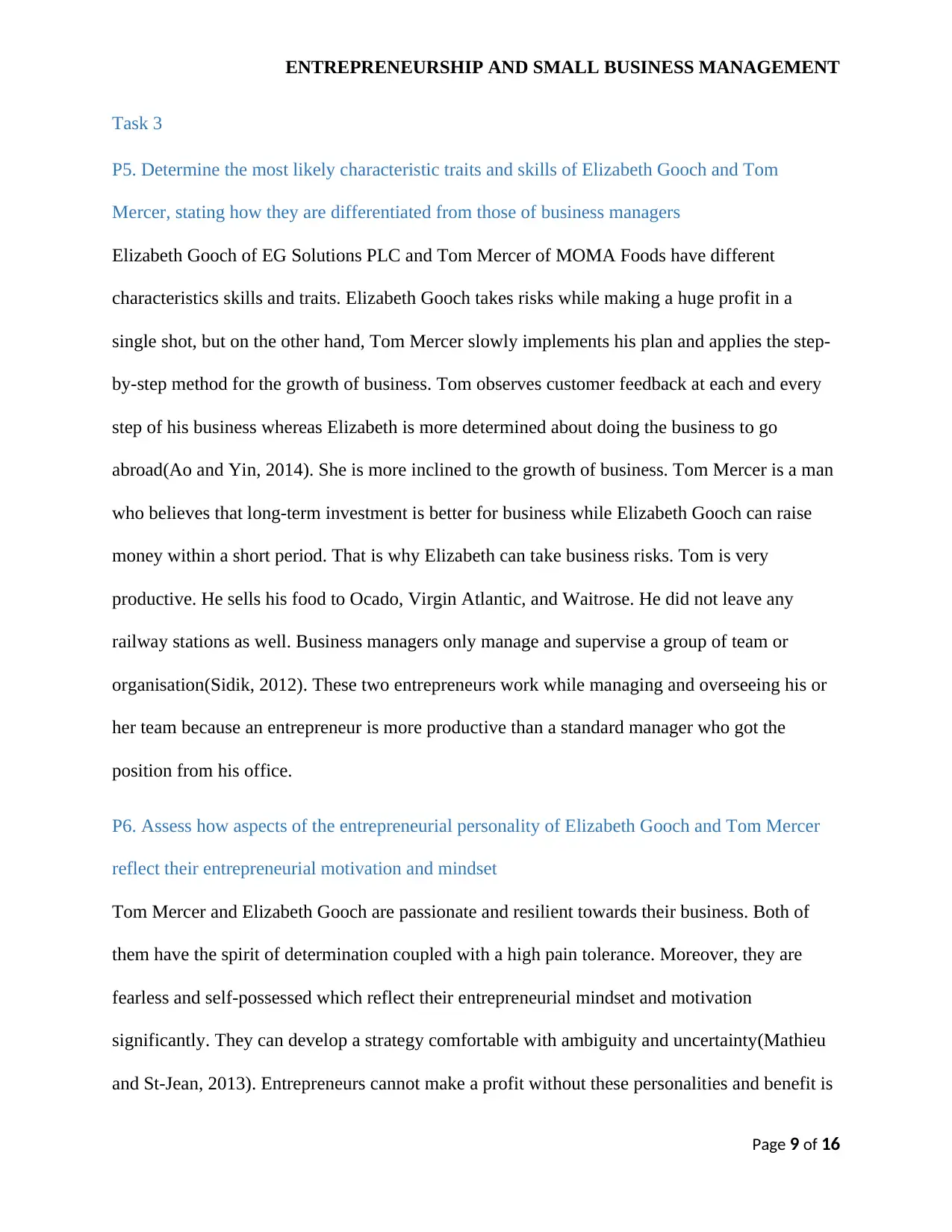
ENTREPRENEURSHIP AND SMALL BUSINESS MANAGEMENT
Task 3
P5. Determine the most likely characteristic traits and skills of Elizabeth Gooch and Tom
Mercer, stating how they are differentiated from those of business managers
Elizabeth Gooch of EG Solutions PLC and Tom Mercer of MOMA Foods have different
characteristics skills and traits. Elizabeth Gooch takes risks while making a huge profit in a
single shot, but on the other hand, Tom Mercer slowly implements his plan and applies the step-
by-step method for the growth of business. Tom observes customer feedback at each and every
step of his business whereas Elizabeth is more determined about doing the business to go
abroad(Ao and Yin, 2014). She is more inclined to the growth of business. Tom Mercer is a man
who believes that long-term investment is better for business while Elizabeth Gooch can raise
money within a short period. That is why Elizabeth can take business risks. Tom is very
productive. He sells his food to Ocado, Virgin Atlantic, and Waitrose. He did not leave any
railway stations as well. Business managers only manage and supervise a group of team or
organisation(Sidik, 2012). These two entrepreneurs work while managing and overseeing his or
her team because an entrepreneur is more productive than a standard manager who got the
position from his office.
P6. Assess how aspects of the entrepreneurial personality of Elizabeth Gooch and Tom Mercer
reflect their entrepreneurial motivation and mindset
Tom Mercer and Elizabeth Gooch are passionate and resilient towards their business. Both of
them have the spirit of determination coupled with a high pain tolerance. Moreover, they are
fearless and self-possessed which reflect their entrepreneurial mindset and motivation
significantly. They can develop a strategy comfortable with ambiguity and uncertainty(Mathieu
and St-Jean, 2013). Entrepreneurs cannot make a profit without these personalities and benefit is
Page 9 of 16
Task 3
P5. Determine the most likely characteristic traits and skills of Elizabeth Gooch and Tom
Mercer, stating how they are differentiated from those of business managers
Elizabeth Gooch of EG Solutions PLC and Tom Mercer of MOMA Foods have different
characteristics skills and traits. Elizabeth Gooch takes risks while making a huge profit in a
single shot, but on the other hand, Tom Mercer slowly implements his plan and applies the step-
by-step method for the growth of business. Tom observes customer feedback at each and every
step of his business whereas Elizabeth is more determined about doing the business to go
abroad(Ao and Yin, 2014). She is more inclined to the growth of business. Tom Mercer is a man
who believes that long-term investment is better for business while Elizabeth Gooch can raise
money within a short period. That is why Elizabeth can take business risks. Tom is very
productive. He sells his food to Ocado, Virgin Atlantic, and Waitrose. He did not leave any
railway stations as well. Business managers only manage and supervise a group of team or
organisation(Sidik, 2012). These two entrepreneurs work while managing and overseeing his or
her team because an entrepreneur is more productive than a standard manager who got the
position from his office.
P6. Assess how aspects of the entrepreneurial personality of Elizabeth Gooch and Tom Mercer
reflect their entrepreneurial motivation and mindset
Tom Mercer and Elizabeth Gooch are passionate and resilient towards their business. Both of
them have the spirit of determination coupled with a high pain tolerance. Moreover, they are
fearless and self-possessed which reflect their entrepreneurial mindset and motivation
significantly. They can develop a strategy comfortable with ambiguity and uncertainty(Mathieu
and St-Jean, 2013). Entrepreneurs cannot make a profit without these personalities and benefit is
Page 9 of 16
⊘ This is a preview!⊘
Do you want full access?
Subscribe today to unlock all pages.

Trusted by 1+ million students worldwide
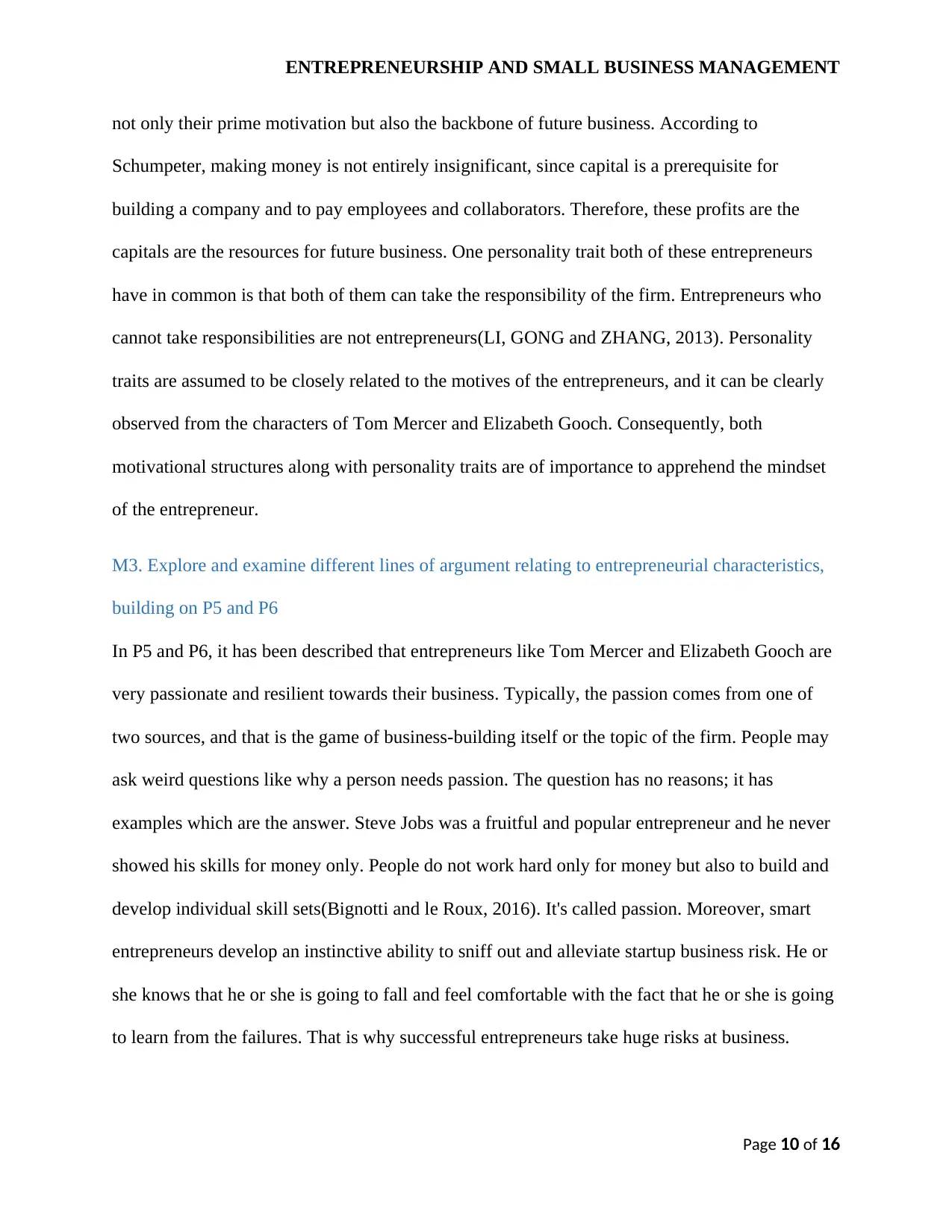
ENTREPRENEURSHIP AND SMALL BUSINESS MANAGEMENT
not only their prime motivation but also the backbone of future business. According to
Schumpeter, making money is not entirely insignificant, since capital is a prerequisite for
building a company and to pay employees and collaborators. Therefore, these profits are the
capitals are the resources for future business. One personality trait both of these entrepreneurs
have in common is that both of them can take the responsibility of the firm. Entrepreneurs who
cannot take responsibilities are not entrepreneurs(LI, GONG and ZHANG, 2013). Personality
traits are assumed to be closely related to the motives of the entrepreneurs, and it can be clearly
observed from the characters of Tom Mercer and Elizabeth Gooch. Consequently, both
motivational structures along with personality traits are of importance to apprehend the mindset
of the entrepreneur.
M3. Explore and examine different lines of argument relating to entrepreneurial characteristics,
building on P5 and P6
In P5 and P6, it has been described that entrepreneurs like Tom Mercer and Elizabeth Gooch are
very passionate and resilient towards their business. Typically, the passion comes from one of
two sources, and that is the game of business-building itself or the topic of the firm. People may
ask weird questions like why a person needs passion. The question has no reasons; it has
examples which are the answer. Steve Jobs was a fruitful and popular entrepreneur and he never
showed his skills for money only. People do not work hard only for money but also to build and
develop individual skill sets(Bignotti and le Roux, 2016). It's called passion. Moreover, smart
entrepreneurs develop an instinctive ability to sniff out and alleviate startup business risk. He or
she knows that he or she is going to fall and feel comfortable with the fact that he or she is going
to learn from the failures. That is why successful entrepreneurs take huge risks at business.
Page 10 of 16
not only their prime motivation but also the backbone of future business. According to
Schumpeter, making money is not entirely insignificant, since capital is a prerequisite for
building a company and to pay employees and collaborators. Therefore, these profits are the
capitals are the resources for future business. One personality trait both of these entrepreneurs
have in common is that both of them can take the responsibility of the firm. Entrepreneurs who
cannot take responsibilities are not entrepreneurs(LI, GONG and ZHANG, 2013). Personality
traits are assumed to be closely related to the motives of the entrepreneurs, and it can be clearly
observed from the characters of Tom Mercer and Elizabeth Gooch. Consequently, both
motivational structures along with personality traits are of importance to apprehend the mindset
of the entrepreneur.
M3. Explore and examine different lines of argument relating to entrepreneurial characteristics,
building on P5 and P6
In P5 and P6, it has been described that entrepreneurs like Tom Mercer and Elizabeth Gooch are
very passionate and resilient towards their business. Typically, the passion comes from one of
two sources, and that is the game of business-building itself or the topic of the firm. People may
ask weird questions like why a person needs passion. The question has no reasons; it has
examples which are the answer. Steve Jobs was a fruitful and popular entrepreneur and he never
showed his skills for money only. People do not work hard only for money but also to build and
develop individual skill sets(Bignotti and le Roux, 2016). It's called passion. Moreover, smart
entrepreneurs develop an instinctive ability to sniff out and alleviate startup business risk. He or
she knows that he or she is going to fall and feel comfortable with the fact that he or she is going
to learn from the failures. That is why successful entrepreneurs take huge risks at business.
Page 10 of 16
Paraphrase This Document
Need a fresh take? Get an instant paraphrase of this document with our AI Paraphraser
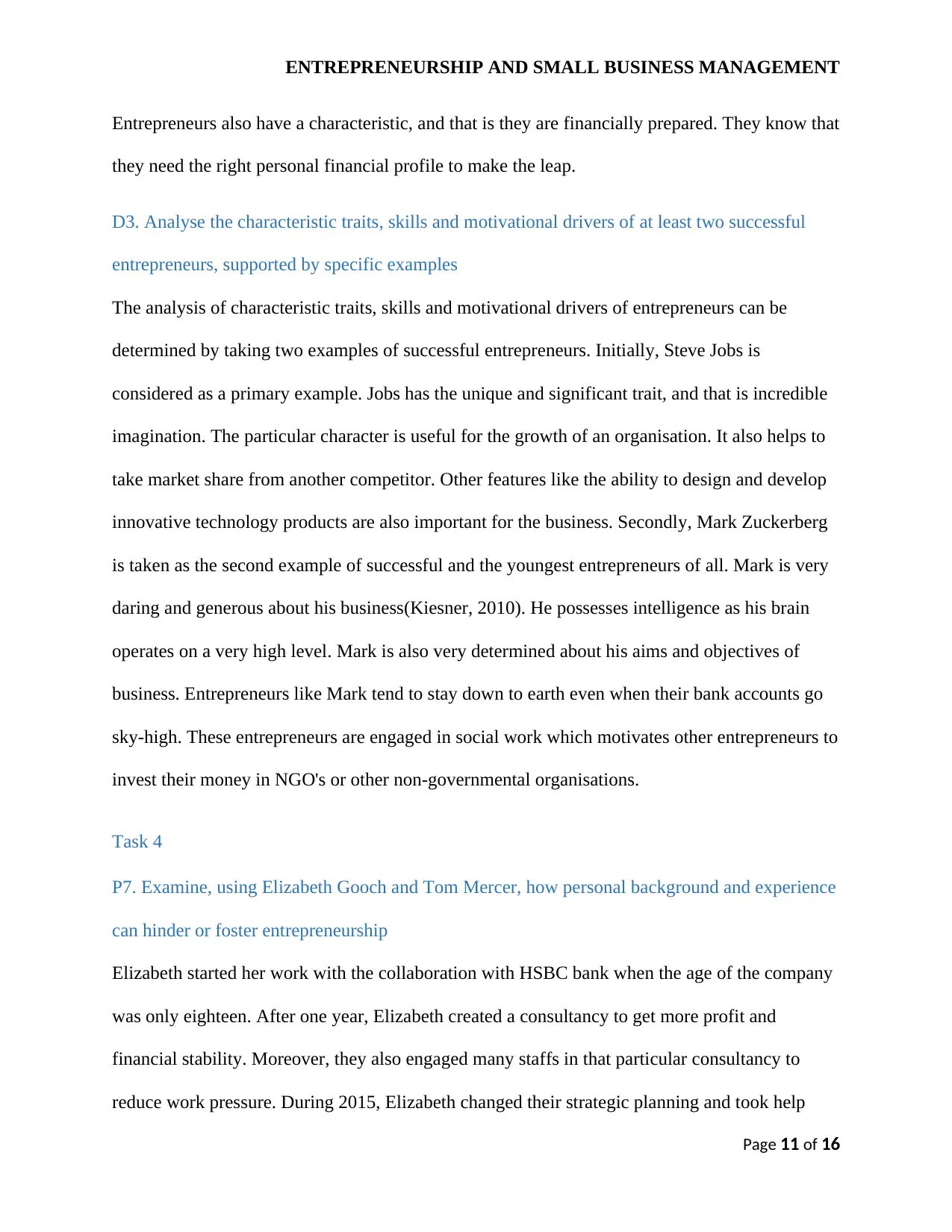
ENTREPRENEURSHIP AND SMALL BUSINESS MANAGEMENT
Entrepreneurs also have a characteristic, and that is they are financially prepared. They know that
they need the right personal financial profile to make the leap.
D3. Analyse the characteristic traits, skills and motivational drivers of at least two successful
entrepreneurs, supported by specific examples
The analysis of characteristic traits, skills and motivational drivers of entrepreneurs can be
determined by taking two examples of successful entrepreneurs. Initially, Steve Jobs is
considered as a primary example. Jobs has the unique and significant trait, and that is incredible
imagination. The particular character is useful for the growth of an organisation. It also helps to
take market share from another competitor. Other features like the ability to design and develop
innovative technology products are also important for the business. Secondly, Mark Zuckerberg
is taken as the second example of successful and the youngest entrepreneurs of all. Mark is very
daring and generous about his business(Kiesner, 2010). He possesses intelligence as his brain
operates on a very high level. Mark is also very determined about his aims and objectives of
business. Entrepreneurs like Mark tend to stay down to earth even when their bank accounts go
sky-high. These entrepreneurs are engaged in social work which motivates other entrepreneurs to
invest their money in NGO's or other non-governmental organisations.
Task 4
P7. Examine, using Elizabeth Gooch and Tom Mercer, how personal background and experience
can hinder or foster entrepreneurship
Elizabeth started her work with the collaboration with HSBC bank when the age of the company
was only eighteen. After one year, Elizabeth created a consultancy to get more profit and
financial stability. Moreover, they also engaged many staffs in that particular consultancy to
reduce work pressure. During 2015, Elizabeth changed their strategic planning and took help
Page 11 of 16
Entrepreneurs also have a characteristic, and that is they are financially prepared. They know that
they need the right personal financial profile to make the leap.
D3. Analyse the characteristic traits, skills and motivational drivers of at least two successful
entrepreneurs, supported by specific examples
The analysis of characteristic traits, skills and motivational drivers of entrepreneurs can be
determined by taking two examples of successful entrepreneurs. Initially, Steve Jobs is
considered as a primary example. Jobs has the unique and significant trait, and that is incredible
imagination. The particular character is useful for the growth of an organisation. It also helps to
take market share from another competitor. Other features like the ability to design and develop
innovative technology products are also important for the business. Secondly, Mark Zuckerberg
is taken as the second example of successful and the youngest entrepreneurs of all. Mark is very
daring and generous about his business(Kiesner, 2010). He possesses intelligence as his brain
operates on a very high level. Mark is also very determined about his aims and objectives of
business. Entrepreneurs like Mark tend to stay down to earth even when their bank accounts go
sky-high. These entrepreneurs are engaged in social work which motivates other entrepreneurs to
invest their money in NGO's or other non-governmental organisations.
Task 4
P7. Examine, using Elizabeth Gooch and Tom Mercer, how personal background and experience
can hinder or foster entrepreneurship
Elizabeth started her work with the collaboration with HSBC bank when the age of the company
was only eighteen. After one year, Elizabeth created a consultancy to get more profit and
financial stability. Moreover, they also engaged many staffs in that particular consultancy to
reduce work pressure. During 2015, Elizabeth changed their strategic planning and took help
Page 11 of 16
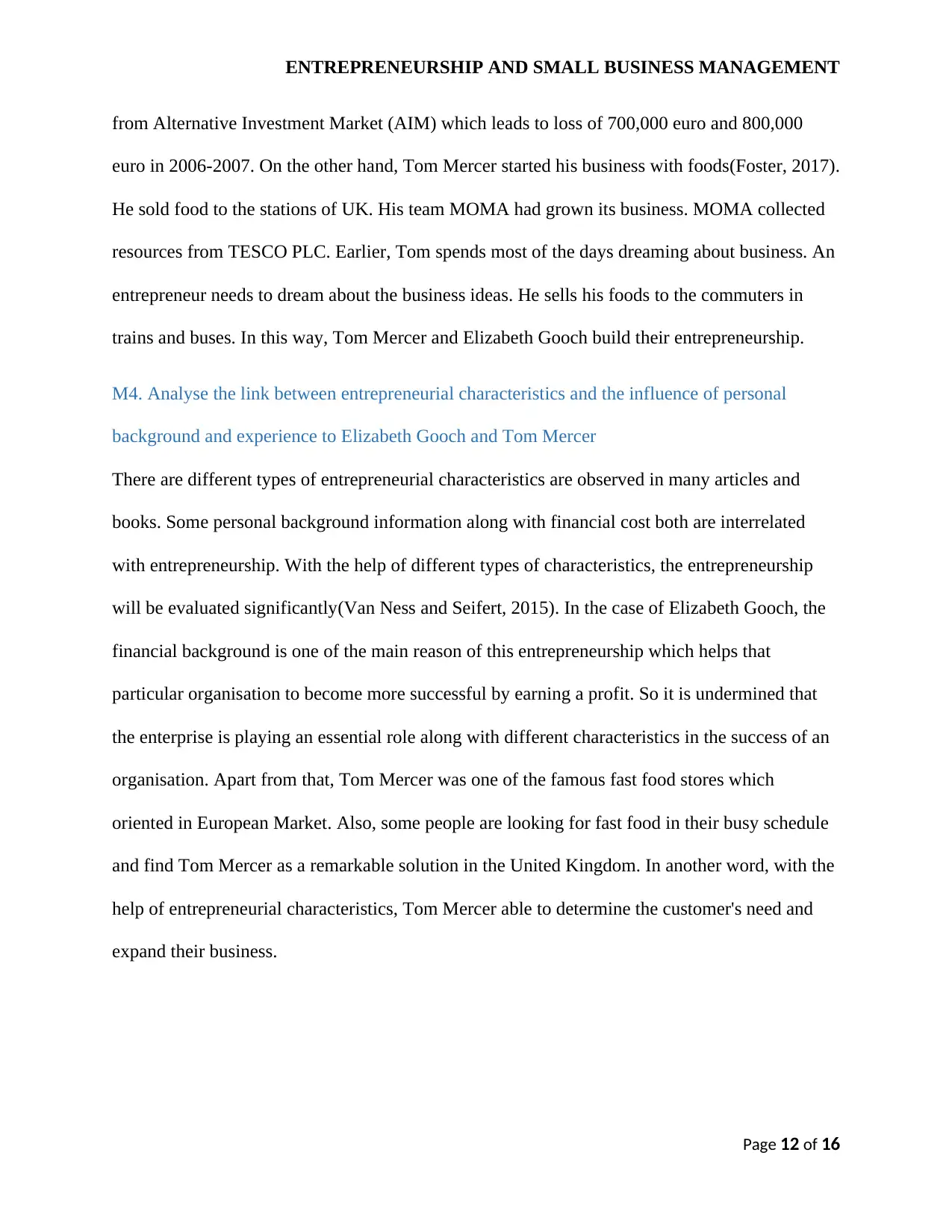
ENTREPRENEURSHIP AND SMALL BUSINESS MANAGEMENT
from Alternative Investment Market (AIM) which leads to loss of 700,000 euro and 800,000
euro in 2006-2007. On the other hand, Tom Mercer started his business with foods(Foster, 2017).
He sold food to the stations of UK. His team MOMA had grown its business. MOMA collected
resources from TESCO PLC. Earlier, Tom spends most of the days dreaming about business. An
entrepreneur needs to dream about the business ideas. He sells his foods to the commuters in
trains and buses. In this way, Tom Mercer and Elizabeth Gooch build their entrepreneurship.
M4. Analyse the link between entrepreneurial characteristics and the influence of personal
background and experience to Elizabeth Gooch and Tom Mercer
There are different types of entrepreneurial characteristics are observed in many articles and
books. Some personal background information along with financial cost both are interrelated
with entrepreneurship. With the help of different types of characteristics, the entrepreneurship
will be evaluated significantly(Van Ness and Seifert, 2015). In the case of Elizabeth Gooch, the
financial background is one of the main reason of this entrepreneurship which helps that
particular organisation to become more successful by earning a profit. So it is undermined that
the enterprise is playing an essential role along with different characteristics in the success of an
organisation. Apart from that, Tom Mercer was one of the famous fast food stores which
oriented in European Market. Also, some people are looking for fast food in their busy schedule
and find Tom Mercer as a remarkable solution in the United Kingdom. In another word, with the
help of entrepreneurial characteristics, Tom Mercer able to determine the customer's need and
expand their business.
Page 12 of 16
from Alternative Investment Market (AIM) which leads to loss of 700,000 euro and 800,000
euro in 2006-2007. On the other hand, Tom Mercer started his business with foods(Foster, 2017).
He sold food to the stations of UK. His team MOMA had grown its business. MOMA collected
resources from TESCO PLC. Earlier, Tom spends most of the days dreaming about business. An
entrepreneur needs to dream about the business ideas. He sells his foods to the commuters in
trains and buses. In this way, Tom Mercer and Elizabeth Gooch build their entrepreneurship.
M4. Analyse the link between entrepreneurial characteristics and the influence of personal
background and experience to Elizabeth Gooch and Tom Mercer
There are different types of entrepreneurial characteristics are observed in many articles and
books. Some personal background information along with financial cost both are interrelated
with entrepreneurship. With the help of different types of characteristics, the entrepreneurship
will be evaluated significantly(Van Ness and Seifert, 2015). In the case of Elizabeth Gooch, the
financial background is one of the main reason of this entrepreneurship which helps that
particular organisation to become more successful by earning a profit. So it is undermined that
the enterprise is playing an essential role along with different characteristics in the success of an
organisation. Apart from that, Tom Mercer was one of the famous fast food stores which
oriented in European Market. Also, some people are looking for fast food in their busy schedule
and find Tom Mercer as a remarkable solution in the United Kingdom. In another word, with the
help of entrepreneurial characteristics, Tom Mercer able to determine the customer's need and
expand their business.
Page 12 of 16
⊘ This is a preview!⊘
Do you want full access?
Subscribe today to unlock all pages.

Trusted by 1+ million students worldwide
1 out of 16
Related Documents
Your All-in-One AI-Powered Toolkit for Academic Success.
+13062052269
info@desklib.com
Available 24*7 on WhatsApp / Email
![[object Object]](/_next/static/media/star-bottom.7253800d.svg)
Unlock your academic potential
Copyright © 2020–2025 A2Z Services. All Rights Reserved. Developed and managed by ZUCOL.





